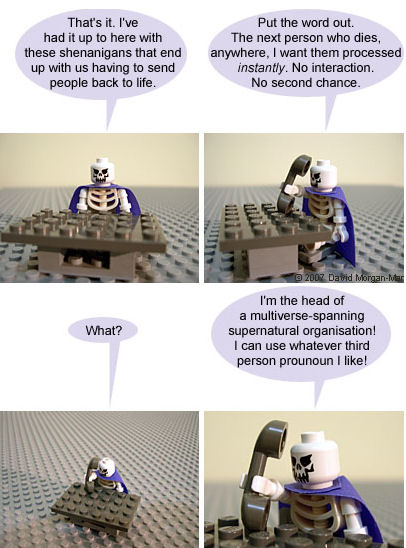Watching the Oscars the other night, I started wondering why we still differentiate between actors and actresses. To be sure, the industry needs to spread those awards around, and it would seem odd if male and female actors were lumped together and only one of them, a man or a woman, got Best Actor … but really, is what Kate Winslet does any different than what Sean Penn does?
No one would dream today of calling a female airline pilot an aviatrix. Words like poetess, spokeswoman, and usherette have slipped into quaint antiquity. Women haven’t been WAFs, WACs, or WAVEs for fifty or sixty years. Unless there’s some compelling reason to point out a person’s gender, why do it at all?
And yet I constantly catch myself writing about harriers and harriettes on my hashing blog, as if finding trail is different when a woman does it. That’s a bad habit, and I’m trying to get away from it. But language itself is a big part of the problem.; He did this; she did that … when it comes to pronouns, you can’t get away from gender.
Unless, that is, you embrace the Singular They:

Maybe Lego Skeletor there can, but I can’t. To people of my generation, “Every child thinks they are unique” is and will always be illiterate. It sounds stupid, it reads stupid. It’s not that we don’t understand the reasoning behind trying to make language gender-inclusive; we do and we try. But we can’t bring ourselves to use “they” and “them” as singular pronouns, because they aren’t.
That doesn’t mean we can only say “Every child thinks he or she is unique.” We can avoid using gender-specific pronouns easily enough by going plural all the way: “All children think they are unique.”
If I’m listening to or reading a story about people, I confess I want to know whether they’re men or women. Not in the sense of differentiating between aviators and aviatrixes or congressmen and congresswomen; just in the human sense of wanting to know whether a person is a he or a she. We identify and think of ourselves not as part of some unisex blob, but as men and women. The concept of “he” and “she” runs deep in our language and our thinking. But so does the concept of singulars and plurals, and you don’t mix them. If you want to avoid using “him” or “her,” use a plural antecedent with your plural pronoun.
And I don’t care what Arnold Zwicky says over at Language Log: we know they is wrong.